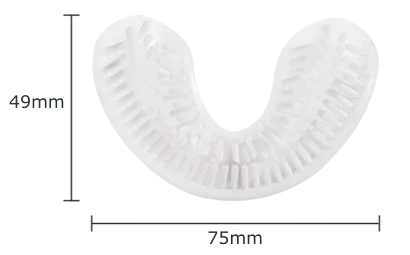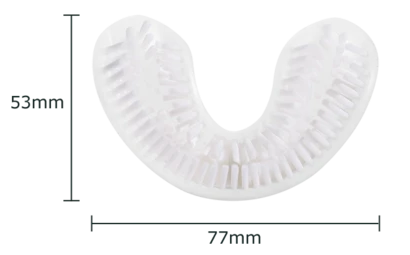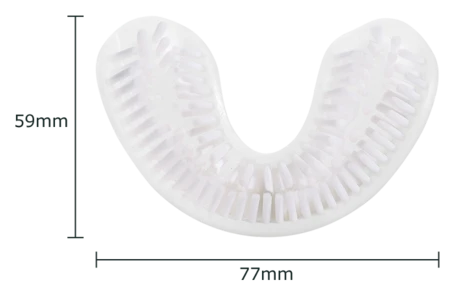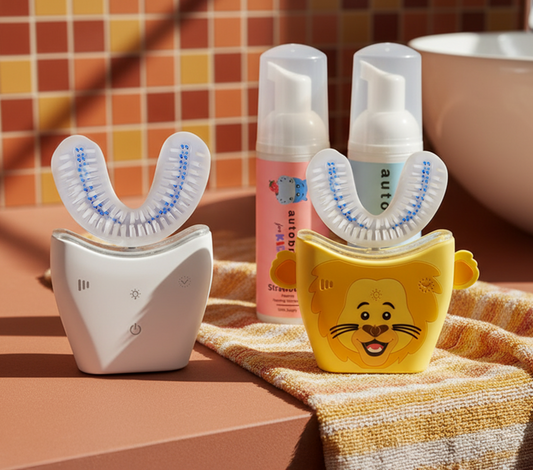
Baby Bottle Tooth Decay
Striving for health-conscious kiddos is the goal of every parent. When it comes to dental health, parents often wait until their children have a full set of teeth before getting started on effective oral hygiene. However, you can and should be starting earlier!
It’s not uncommon for parents to be a little lackadaisical with their children’s baby teeth. After all, they’re just gonna fall out anyway, right? Well, as it turns out, taking care of your kiddo’s baby teeth is crucial for their development. Baby teeth help with speaking, eating, and even breathing properly throughout children’s development stages.
Tooth Tip: Click here to get the ultimate baby toothbrushing guide and learn what to expect in the first 18+ months of a baby's dental development.
Baby teeth aren’t taken care of properly it could lead to significant drawbacks in their behavioral and physical development - particularly in their jaw and face.
Also, dentists don’t treat tooth decay the same in children as they do in adults. Younger children aren’t able to get fillings, so dentists typically have to either ignore tooth decay or remove the tooth entirely, depending on the situation. This can lead to some fairly disastrous results as your kiddos develop. One potential cause of tooth decay in young children is known as baby bottle tooth decay.
What Is Baby Bottle Tooth Decay?

Baby bottle tooth decay, sometimes known as bottle mouth, bottle rot, or nursing bottle syndrome is caused by your child’s teeth being exposed to sugary liquids for prolonged periods of time. This is mostly common when children are allowed to go down for a nap, or for bedtime, with a bottle. If the child falls asleep with the bottle in their mouth, their teeth will be exposed to those sugary liquids for long periods which can lead to tooth decay.
Now, this isn’t unique to bottles of juice or other obvious sugar-laden liquids. In fact, the most common liquids relating to baby bottle tooth decay are:
- Milk
- Formula
- Breast Milk
Nearly every liquid you give to your child has some amount of sugar in it. So, leaving these liquids to sit on their teeth for long periods can lead to poor dental health in your child’s teeth and gums.
Signs of Baby Bottle Tooth Decay

Young children are often unable to communicate effectively, so it’s important to be on the lookout for the tell-tale signs of tooth decay. Have a look at your child’s teeth and gums regularly to ensure their dental health is shipshape. Some of the early signs of baby bottle tooth decay are:
- Yellow or brown spots on the teeth
- Tooth pain unrelated to teething
- Gum pain unrelated to teething
- White spots on teeth
If you notice any of these signs on your child’s teeth you should schedule a dentist appointment as soon as possible, even if it’s the first time your child is visiting a dentist.
How to Treat Baby Bottle Tooth Decay
While there typically isn’t much dentists can do to treat tooth decay and cavities in young children, teeth can sometimes fix themselves - under the right circumstances, that is. The ability for teeth to fix cavities on their own is called remineralization. This process requires plenty of vitamins and minerals such as magnesium.
If your child isn’t getting enough of these essential vitamins and minerals, then their teeth won’t be able to do much in the way of remineralization. Also, ensure you’re frequently brushing, flossing, and avoiding sugary drinks at bedtime to help reverse the effects of tooth decay.
Toothy Tip: AutoBrush Hydroxyapatite Dental Flossers contain some of the essential minerals your kiddo’s teeth need to succeed, and can help treat cavities and tooth decay.
How to Prevent Baby Bottle Tooth Decay
The best way to treat baby bottle tooth decay is to prevent it entirely! The good news is that this ailment is completely preventable. Taking proper care of your child’s teeth means tooth decay won’t have time to settle into those pearly whites, and identifying/treating those early signs of tooth decay is crucial to avoiding baby bottle tooth decay.
If you still want your child to have a bottle before bedtime, that’s totally fine. After they’re finished...
- Use a warm washcloth and gently wipe their teeth and gums to prevent bacteria buildup
- Give them a bottle of water afterward drinking juice to wash away lingering sugars
If you’re breastfeeding, keep in mind that breast milk still has sugar in it. Using a wet washcloth goes a long way and can help prevent bacteria buildup on your child’s teeth.
Toothy Tip: The AutoBrush Ellie Teether is designed as a first-stage toothbrush. It can soothe your child’s gums and help them get comfortable with the idea of brushing!
As your kids get older, try introducing soft bristled toothbrushes to keep their teeth sparkly clean.
Final Thoughts

Baby bottle tooth decay is preventable. Taking the steps to inspect and clean your kiddo’s teeth and gums can work wonders for their oral health. Keep in mind - having a bottle before bedtime isn’t a bad thing to do and you can certainly keep doing so. This experience can be very soothing for a child as they try to fall asleep. However, ensure you’re still keeping those teeth and gums clean. If they’re young, try using that wet washcloth to gently wash away the yucky bacteria. Using the techniques above will significantly reduce the chances of your child developing baby bottle tooth decay.












